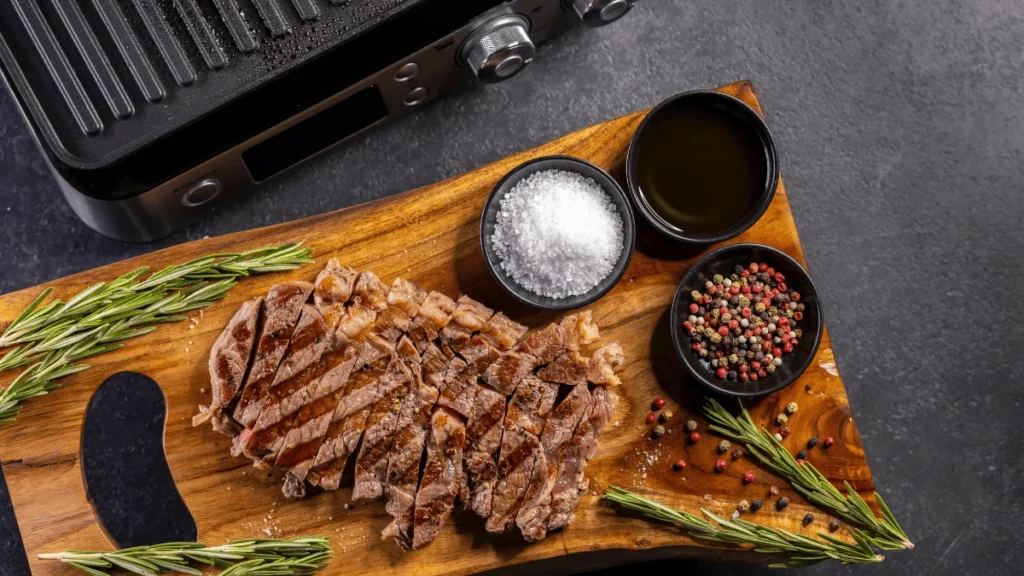When it comes to improving your outdoor cooking, your Blackstone griddle is the ideal tool for all your Blackstone recipes. From making a quick breakfast to a delicious burger for lunch and a juicy steak for dinner, this griddle can do it all. With its large surface area and the ability to distribute heat evenly, the Blackstone makes cooking easier, faster, and more enjoyable.
In this guide, you will learn the basics and best practices associated with Blackstone cooking from the tools and ingredients to season and clean the griddle. There are step-by-step guides provided for breakfast, lunch, dinner and even dessert so that you have the knowledge and skill to make tasty dishes each and every time.
Spiced up and ready to rock your world with the jaw-dropping Blackstone recipes? Let’s go!
Prepping Your Blackstone: Cleaning and Seasoning
Cleaning Your Blackstone Griddle
Apply a light film of oil to your Blackstone using a paper towel and wipe it down. That eliminates loose dust and any debris. After cooking, allow the griddle to cool slightly before scraping off food scraps with a griddle scraper. Apply warm soapy water to it and clean it. Be sure not to use abrasive cleaners on it. Rinse and dry completely when done.
Why Seasoning Matters
Seasoning forms a barrier that stops corrosion and prevents food from sticking. It is similar to applying a nonstick surface to a griddle.
How to Season Your Blackstone
Start with a clean, dry griddle. Lightly coat the entire surface with oil, like canola or vegetable oil. Use a paper towel to spread it thinly and evenly. Heat the griddle to medium-high heat for about 15-20 minutes. Let it cool completely. You’ll notice a darker color on the surface; that’s the seasoning. Repeat this process 2-3 times for a great finish. You only need to season it thoroughly the first time and then do a light seasoning before each use. A thin layer of oil before you begin cooking helps prevent sticking. After each cook, you should clean and lightly re-season your griddle.
Essential Blackstone Tools and Ingredients
Griddle Tools
You need the right tools for your Blackstone. A wide spatula flips burgers and pancakes easily. A griddle scraper cleans up stuck-on food. A meat thermometer checks if your beef is cooked through.
Best Ingredients for Blackstone Cooking
Different foods cook differently on a Blackstone. Thicker cuts of beef need more time. Onions and peppers caramelize beautifully. Using the right amount of oil prevents sticking. For your Blackstone recipes, fresh, high-quality ingredients can make all the difference. Make sure to have a selection of your favorite vegetables and meats ready to cook.
| Ingredients | Quantity | Note |
|---|---|---|
| Beef | As needed | Use a meat thermometer for doneness. |
| Onions | 1-2 | Slice thinly for even cooking. |
| Bell Peppers | 1-2 | Choose your favorite colors! |
| Cooking Oil | 2-3 tablespoons | Use a high-heat oil like canola. |
| Beef Bacon | As needed | Cook until crispy. |
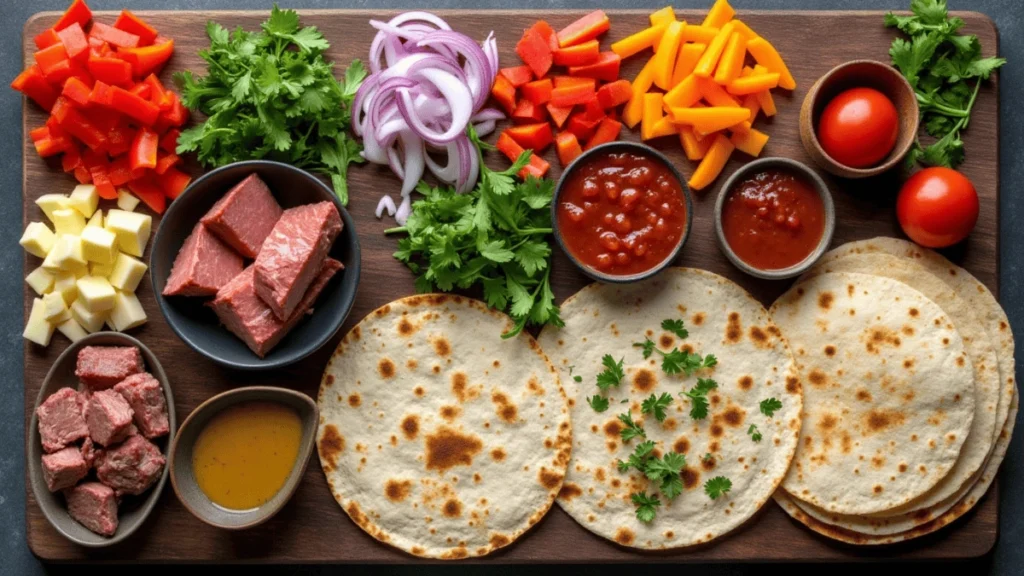
Tips for Choosing Ingredients
Buy high-quality ingredients. Fresh beef tastes better. Choose vegetables that are firm and not bruised. Using the right amount of oil is key to preventing sticking. Too little oil makes things stick; too much makes them greasy.
Blackstone Breakfast Recipes
Fluffy Pancakes
Make pancakes on your Blackstone! Mix pancake mix according to the box. Pour small circles of batter onto the hot, oiled griddle. Flip when bubbles form. Serve with butter and syrup.
Perfect Eggs
Crack eggs directly onto the hot Blackstone. Cook until the whites are set and the yolks are cooked to your liking. Add cheese or veggies for extra flavor.
Crispy Beef Bacon
Cook beef bacon on medium heat. Flip occasionally until crispy.
Delicious Sausage
Cook sausage patties or links on medium heat. Brown on all sides. Use a meat thermometer to check the internal temperature.
Tips for Blackstone Breakfasts
Use medium heat to avoid burning. Keep your Blackstone clean to prevent sticking. A little oil goes a long way. Enjoy your delicious Blackstone breakfast!
Blackstone Lunch and Dinner Recipes
Quick Blackstone Burgers
Make juicy burgers! Form ground beef into patties. Season with salt and pepper. Cook on a medium-hot Blackstone until browned on both sides and cooked to your liking. Use a meat thermometer to check the temperature. Add cheese during the last minute of cooking. Serve on buns with your favorite toppings.
Easy Blackstone Fajitas
Slice bell peppers and onions. Toss with fajita seasoning. Cook on the Blackstone until tender and slightly charred. Add strips of beef and cook until browned. Serve with warm tortillas, salsa, and sour cream.
Grilled Steak on the Blackstone
Season steaks with salt, pepper, and garlic powder. Place them on a hot Blackstone. Cook to your desired doneness, using a meat thermometer. Let the steak rest for a few minutes before slicing.
Blackstone Grilled Vegetables
Toss your favorite vegetables (like zucchini, squash, and asparagus) with olive oil and herbs. Spread them on the Blackstone. Cook until tender and slightly charred, turning occasionally.
Cooking Times and Temperatures
Cooking times depend on the thickness of the food and your Blackstone’s heat. Use a meat thermometer for beef to ensure it’s cooked safely. Vegetables are done when they are tender-crisp. For burgers, aim for an internal temperature of 160°F (71°C). Steaks can be cooked to various doneness levels, depending on preference. Remember to always adjust cooking times based on your griddle’s temperature and the thickness of your food.
Blackstone Pizza and Dessert Recipes
Making Blackstone Pizzas
Prepare pizza dough. Spread it thinly on the hot Blackstone. Add your favorite sauce, cheese, and toppings. Cook until the crust is crispy and the cheese is melted and bubbly. Use a spatula to flip the pizza halfway through cooking for even browning.
Grilled Pineapple
Slice a pineapple into rings. Grill the rings on medium heat until slightly caramelized. You can add a sprinkle of brown sugar for extra sweetness.
Grilled Peaches
Halve some peaches. Place them cut-side down on a lightly oiled Blackstone. Grill until slightly softened and grill marks appear. Serve warm with a scoop of vanilla ice cream or whipped cream.
Dessert Grilling Tips
Use medium heat to avoid burning your desserts. A little oil prevents sticking. Sweet toppings, like brown sugar or cinnamon, add extra flavor. Enjoy these sweet treats cooked on your Blackstone!
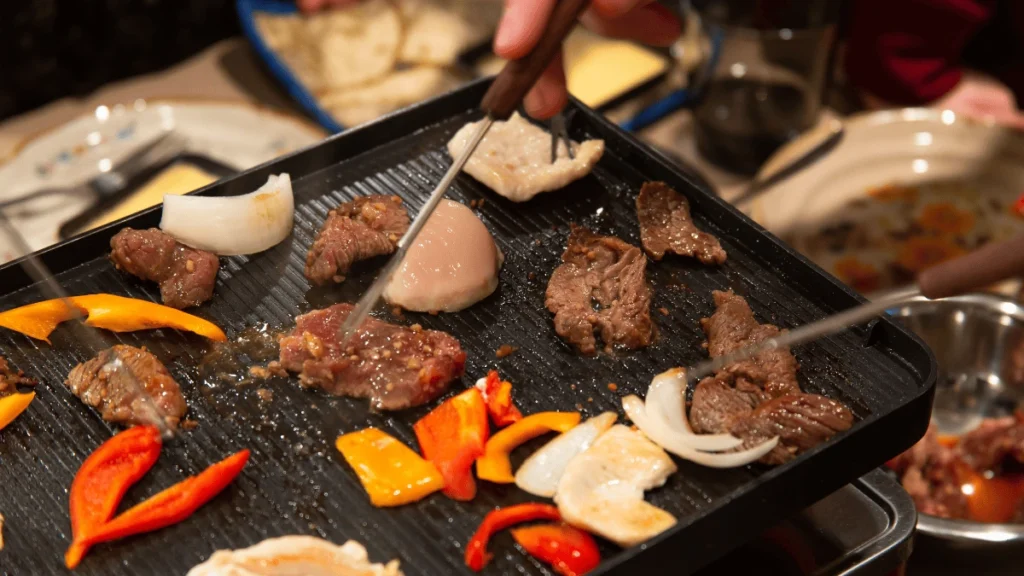
Blackstone Grilling Techniques
Direct Heat Grilling
Direct heat cooks food quickly over the open flame. It’s great for searing burgers or getting nice grill marks on steaks. Keep the food moving to avoid burning.
Indirect Heat Grilling
Use indirect heat for foods that need longer cooking times, like larger cuts of beef. Place food away from the direct heat source. Close the lid to trap heat and cook evenly.
Searing on a Blackstone
Searing creates a flavorful crust on meat. Get your Blackstone very hot. Add a little oil. Sear the beef for a few minutes per side before moving it to an area with less heat to finish cooking.
Smoking on a Blackstone
You can even smoke food on your Blackstone! Use wood chips or chunks in a smoker box placed on one side of the griddle. Cook your food indirectly, with the lid closed.
Tips for Perfect Results
Use a meat thermometer for beef to ensure it’s cooked to the right temperature. Don’t overcrowd the griddle; it will lower the temperature. Keep your Blackstone clean for even cooking and easy cleanup. Experiment with different heat levels and cooking times to find what works best for you.
Troubleshooting Common Blackstone Issues
Food Sticking to the Griddle
Food sticking happens when the griddle isn’t hot enough, or it’s not seasoned well. Make sure your griddle is hot before adding food. Use enough oil to coat the surface, but not so much that it becomes greasy. A well-seasoned griddle naturally prevents sticking. If food still sticks, try scraping it off with a griddle scraper immediately after cooking to avoid it baking on.
Uneven Cooking Temperatures
Uneven cooking usually means your griddle isn’t hot all over. This can happen if the burners aren’t adjusted correctly, or if the griddle itself isn’t flat. Check your burners to make sure they are all lit and adjusted evenly. If the griddle isn’t flat, you might need to adjust the leveling feet.
Cleaning Difficulties
Stubborn food residue might mean you didn’t scrape it off immediately after cooking. Let the griddle cool a little, then scrape with a stiff griddle scraper. For tougher messes, soak the griddle with warm, soapy water or a mixture of warm water and vinager. Avoid harsh abrasives. Always rinse and dry completely. Remember, regular cleaning and light re-seasoning help prevent future cleaning issues.
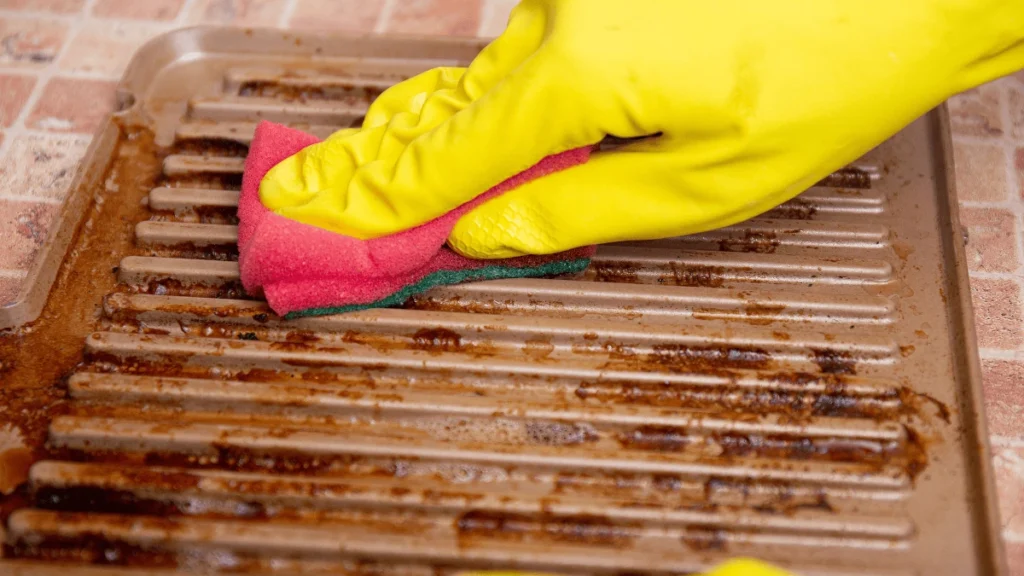
Blackstone Griddle Pizza
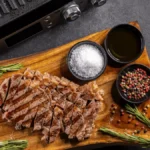
Make crispy and delicious pizza right on your Blackstone griddle with this easy recipe. Perfect for outdoor cooking!
- Blackstone Griddle
- Spatula
Pizza Dough
- 1 ball pizza dough (store-bought or homemade)
Toppings
- 1/2 cup pizza sauce (your favorite kind)
- 1 cup mozzarella cheese (shredded)
- 1/2 cup pepperoni (or preferred toppings)
- 1 tbsp olive oil (for cooking)
Preheat the Blackstone griddle to medium heat and lightly oil the surface.
Roll out the pizza dough into a thin circle.
Place the dough onto the griddle and cook for 2-3 minutes until bubbles form and the bottom is golden.
Flip the dough and quickly add pizza sauce, cheese, and your toppings.
Cover with a dome or tent with foil and cook for another 5-7 minutes until the cheese is melted and bubbly.
Remove from the griddle, let cool for a few minutes, slice, and enjoy!
Customize your toppings and try different cheeses for a unique Blackstone pizza experience.
Ultimately: Mastering Your Blackstone Griddle
Ready to Cook with Your Blackstone
Now that you’ve learned the basics of Blackstone cooking, it’s time to put your skills to the test! Your griddle is ready for anything – from tasty breakfasts to delicious dinners. Keep experimenting with new recipes and techniques, and with each use, you’ll get better. For example, why not try making a Cheesy Gordita Crunch on your Blackstone? Imagine crispy taco shells, melted cheese, and a warm tortilla—all made on your griddle!
Remember to clean and lightly re-season your griddle after each cook. The more you practice, the more confident you’ll become in creating amazing meals.
Happy cooking, and enjoy your Blackstone recipes.
Frequently Asked Questions
Cleaning My Blackstone
Q: How do I clean my Blackstone after cooking?
A: Let it cool slightly, then scrape off food with a griddle scraper. Wash with warm, soapy water, rinse, and dry completely. Avoid harsh cleaners.
Seasoning My Blackstone
Q: Why is seasoning important?
A: Seasoning creates a natural, non-stick surface, preventing sticking and rust. It makes cooking easier and cleanup faster.
Q: How do I season my Blackstone?
A: Clean and dry the griddle. Apply a thin layer of oil (like canola or vegetable oil). Heat on medium-high for 15-20 minutes. Let cool. Repeat 2-3 times initially, then lightly before each use.
Blackstone Cooking Tips
Q: What’s the best oil for cooking on my Blackstone?
A: High-heat oils like canola oil are ideal.
Q: What temperature should I use for different foods?
A: Medium heat is usually best for most things. Use a meat thermometer for beef to ensure it’s cooked properly. Adjust cooking times depending on the thickness of your food.
Q: What if food sticks to my Blackstone?
A: Make sure your griddle is hot and properly seasoned. Use enough oil, but not too much. If food sticks, scrape it off right away.
Q: My Blackstone isn’t cooking evenly. What can I do?
A: Check that your burners are lit and adjusted evenly. Ensure your griddle is level.
Q: How can I remove stubborn food residue?
A: Soak the griddle in warm, soapy water or a mixture of warm water and vinager. Avoid harsh abrasives. Always rinse and dry thoroughly.
Q: Where can I find more Blackstone cooking tips and recipes?
A: Check out Minimalist Baker for simple and delicious griddle recipes!

